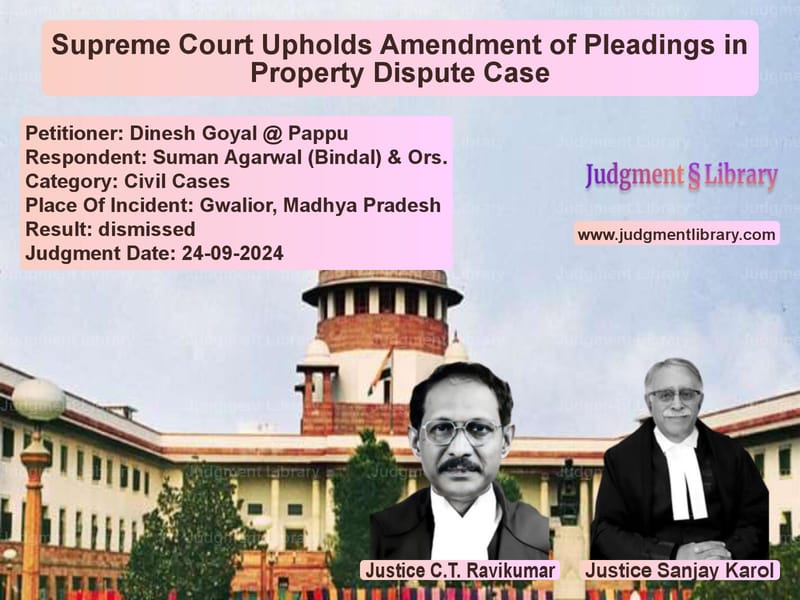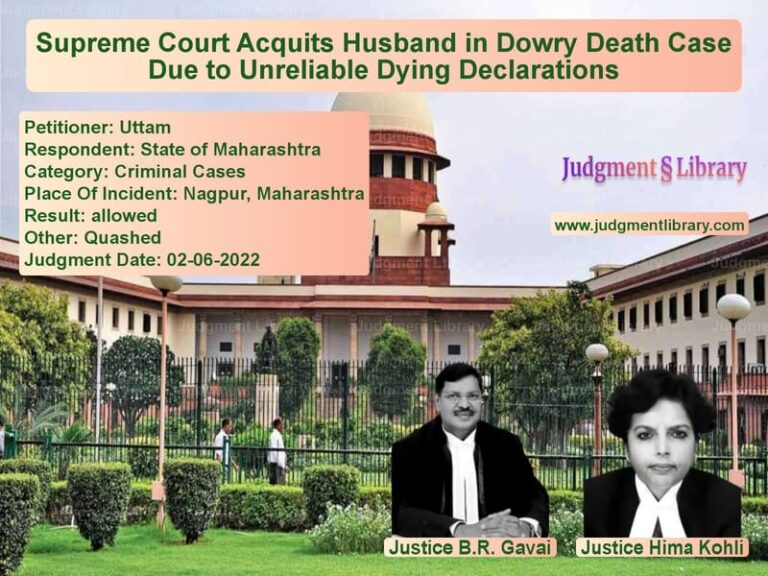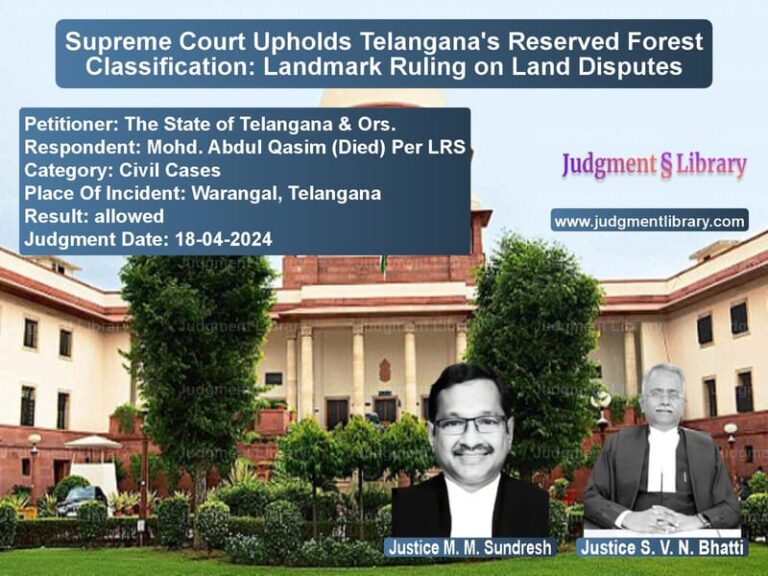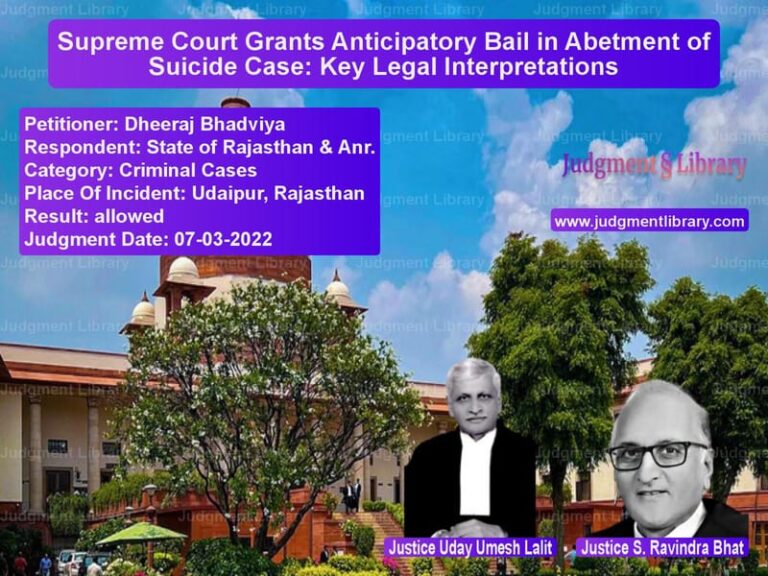Supreme Court Upholds Amendment of Pleadings in Property Dispute Case
The case of Dinesh Goyal @ Pappu vs. Suman Agarwal (Bindal) & Ors. involved a long-standing family property dispute where the Supreme Court ruled in favor of allowing an amendment to the plaint. In its judgment dated September 24, 2024, the Court upheld the Madhya Pradesh High Court’s decision, permitting the respondent to challenge the validity of a will and include additional properties in the partition suit.
This ruling clarifies the scope of Order VI Rule 17 of the Code of Civil Procedure, 1908 (CPC), which governs amendments to pleadings, and reaffirms that courts must adopt a liberal approach while considering amendments necessary for the real issues in controversy.
Background of the Case
The dispute concerns a property located in Gwalior, Madhya Pradesh, originally owned by Smt. Katoribai. The relevant facts are:
- The property was purchased by registered sale deed on January 1, 1987.
- On January 14, 2013, Smt. Katoribai executed a will in favor of the appellant (defendant).
- She passed away on March 5, 2013.
- The plaintiff (respondent) filed a suit claiming 1/5th share in the property, arguing that it belonged to their father, Late Shri Gyan Chand Goyal.
- The defendant claimed exclusive ownership based on the will and subsequent agreements dated December 20 and December 28, 2014.
Legal Proceedings
Filing of Suit and Initial Developments
- The plaintiff filed Civil Suit No.241-A/2016 before the 8th Civil Judge, Class-2, Gwalior.
- The defendant filed a written statement on July 25, 2016, relying on the will.
- The court granted a temporary injunction, barring third-party rights.
Amendment Application and Trial Court’s Rejection
- On October 26, 2017, the plaintiff sought to amend the plaint to:
- Add a list of movable properties for partition.
- Challenge the validity of the will, alleging forgery.
- The Trial Court rejected the application on March 14, 2018, stating:
- The amendment was unduly delayed.
- The plaintiff failed to show due diligence in raising these issues earlier.
High Court Ruling in Favor of Amendment
- The plaintiff filed a miscellaneous petition before the Madhya Pradesh High Court.
- On August 21, 2019, the High Court allowed the amendment, stating:
- The dispute cannot be resolved without determining the genuineness of the will.
- The trial court’s approach was hyper-technical.
- Since the cross-examination of the plaintiff had not begun, no prejudice was caused.
Appeal Before the Supreme Court
The appellant challenged the High Court’s decision, arguing:
- The amendment was filed after the commencement of the trial, violating Order VI Rule 17 CPC.
- It would prejudice the defendant’s case and delay proceedings.
- The plaintiff was already aware of all facts but failed to act earlier.
Supreme Court’s Observations
The Supreme Court, comprising Justices C.T. Ravikumar and Sanjay Karol, upheld the High Court’s ruling and dismissed the appeal.
1. Liberal Approach to Amendments
- The Court emphasized that amendments should be liberally allowed if they help determine the real issues in controversy.
- It cited Life Insurance Corporation of India v. Sanjeev Builders Pvt. Ltd. (2022), which reaffirmed that amendments should be refused only if they:
- Withdraw clear admissions.
- Raise time-barred claims.
- Change the nature of the suit.
2. Necessity of Deciding the Will’s Validity
- The Court ruled that partition cannot proceed without resolving the validity of the will.
- It stated:
“If there is a Will, it has to be honored. If a party challenges its validity, it must be adjudicated first.”
3. Delay in Filing the Amendment
- While the amendment was filed after trial commencement, the Court ruled that it was necessary for complete adjudication.
- It cited Usha Balasaheb Swami v. Kiran Appaso Swami (2007), stating:
“Amendments should be permitted unless they introduce an entirely new cause of action.”
4. Prejudice to Defendant
- The Court found no undue prejudice to the defendant.
- It stated:
“The defendant’s case remains the same. No valid defense is lost due to the amendment.”
Final Judgment
The Supreme Court ruled:
- The appeal was dismissed, and the High Court’s decision was upheld.
- The amendment was allowed, and the trial court was directed to decide the case expeditiously.
- The ruling was limited to procedural aspects and did not determine the will’s validity.
Implications of the Judgment
This ruling has significant implications:
- Clarification on Order VI Rule 17 CPC: Courts must balance procedural limitations with substantive justice.
- Importance of Will Validation: Courts must resolve will disputes before proceeding with partition suits.
- Encouragement of Complete Adjudication: Prevents multiple litigations by allowing all issues to be decided in one suit.
The Supreme Court’s decision reinforces the principle that procedural technicalities should not obstruct substantial justice. This judgment ensures that all claims related to disputed properties are fairly adjudicated before final partition.
Petitioner Name: Dinesh Goyal @ Pappu.Respondent Name: Suman Agarwal (Bindal) & Ors..Judgment By: Justice C.T. Ravikumar, Justice Sanjay Karol.Place Of Incident: Gwalior, Madhya Pradesh.Judgment Date: 24-09-2024.
Don’t miss out on the full details! Download the complete judgment in PDF format below and gain valuable insights instantly!
Download Judgment: dinesh-goyal-@-pappu-vs-suman-agarwal-(binda-supreme-court-of-india-judgment-dated-24-09-2024.pdf
Directly Download Judgment: Directly download this Judgment
See all petitions in Property Disputes
See all petitions in Succession and Wills
See all petitions in Public Interest Litigation
See all petitions in Judgment by C.T. Ravikumar
See all petitions in Judgment by Sanjay Karol
See all petitions in dismissed
See all petitions in supreme court of India judgments September 2024
See all petitions in 2024 judgments
See all posts in Civil Cases Category
See all allowed petitions in Civil Cases Category
See all Dismissed petitions in Civil Cases Category
See all partially allowed petitions in Civil Cases Category







